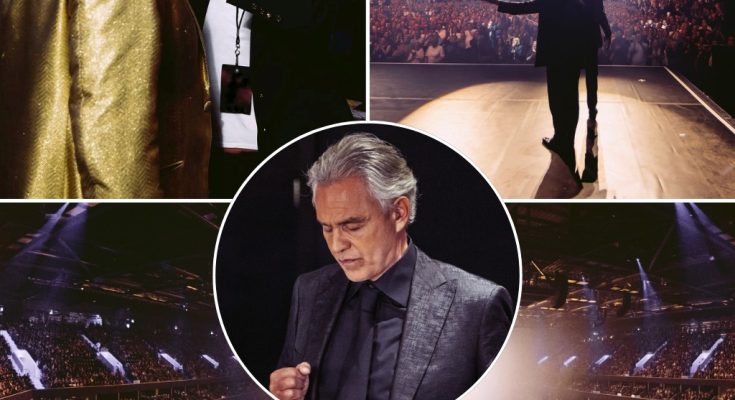Inside Manchester’s AO Arena, every breath, every heartbeat, seemed to synchronize as Andrea Bocelli stepped into the spotlight, bathed in a soft golden glow. Clutching his microphone with the gentle assurance of a master, Bocelli launched into “Nessun Dorma” — and the entire arena, packed with thousands of stunned fans, hung onto every soaring note. It wasn’t a concert. It was a religious experience.
As Bocelli’s tenor flooded the massive venue, couples squeezed each other’s hands.
Older fans wiped tears from their cheeks.
Children sat wide-eyed, mouths agape, watching a man who seemed to bend time and sound to his will.
“It’s not just hearing him,” one audience member gasped. “It’s feeling him in your bones.”
Another fan, voice shaking, told reporters afterward, “You could close your eyes and believe heaven had opened just for us.”
From “Con te partirò” to “Ave Maria”, every song was a masterpiece — delicate, powerful, utterly transcendent.
Joining Bocelli onstage for selected duets were surprise guest performers, including soprano Aida Garifullina and his son Matteo Bocelli, who drew gasps with his velvet voice during their duet “Fall On Me.”
Each appearance sparked fresh standing ovations.
Each note pulled the crowd deeper into awe.
At one point, Bocelli paused, smiling warmly as the arena erupted into deafening cheers before he could even begin the next song.
“Thank you, Manchester,” he said humbly. “You make me feel at home.”
The final crescendo of “Time to Say Goodbye” brought the entire arena to its feet, tears streaming, hands raised, voices lost.
For a few precious hours, Andrea Bocelli lifted a city — weary from daily life — into something pure, luminous, and utterly unforgettable.
As fans spilled into the Manchester night, one thing was certain:
They hadn’t just witnessed a concert.
They had witnessed history.



